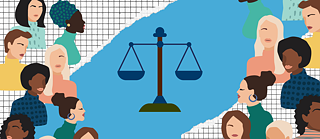24th February 2022 Bodies Like Mine

Who receives sympathy in times of war? How can skin colour shape the experiences of refugees? In this diary entry, Joshua Muyiwa reflects on the way Black people were treated when the Russia-Ukraine war began.
In a big bathroom bounding with bougainvillea and luminescent light – far, far away from my apartment in the city, I took a risqué photo of myself. And then, I sent it over to one of the many men I’ve been flirting with on and off. This is the first time ever I’m doing something like this. He sends me a lot of them, and I’ve completely run out of ways to sheepishly say “hot” in response to his photos. So, this time I decided to send one back to him instead.It isn’t like my body – covered and uncovered – has been a permanent part of my artistic practice. But attempts at photographing my own body have always been to make it fancier, to feature it or have been an exercise in finding myself within this frame.
Being Black is brutally beautiful, and it is also burdensome. It’s like you can’t escape your exterior ever. I’d always assumed that the reaction to my body wouldn’t be the right one. I thought I’d always be measured up against myths surrounding our bodies, and I would fall short. The many assumptions about me that are made from the first glance are things I find myself working against from the get-go in any interaction.
“The Right Skin Colour”
And from this place of insecurities, sending out a photo to an interested party seems so unlike me. Today must be special. Today is also the day one man declared war on another sovereign country. It is also the day that reminded me that the colour of one’s skin is actually the most globally recognised passport. Having the right skin colour breaks boundaries, across beauty, across countries too. Global leaders and news anchors are constantly reminding me that these people’s pain is so much greater than anything I might have experienced in my life. The reason: the people under attack are “civilised”, have “blue eyes and blond hair”, “are Europeans” and “vote in free elections” and so on. Everybody is heartbroken and teary-eyed at these images of destruction and of denizens with their entire lives packed into bulging bags.Who Matters?
Meanwhile, bodies like mine were held hostage at border crossings. Bodies like mine were kept from saving their own lives with beatings and threats of the bullet from the border security forces of the invaded nation. Bodies like mine don’t matter at all. Are bodies like mine not good enough for your tears, I wonder? Why am I keeping track of the Malayali girl giving us updates from the Ukraine-Poland border on the goings-on? Did those Ugandan students find their way to Turkey? - That boy’s Twitter account seems to have been suspended. - Did every one of them with bodies like mine get something to eat, did they get to drink water and have a warm bed eventually? Or, because bodies like mine might not watch Netflix and not have Instagram accounts and come from impoverished, remote countries, do they deserve to die? Bodies like mine are used to fighting, but we aren’t accustomed to war.Today: I took a risqué photo of my Black body.
Today: Russia declared war on Ukraine.
Today: Black bodies were beaten and banished from the borders as a reminder of their place in the world, yet again.
All of these things happened today. All of these things are true.


